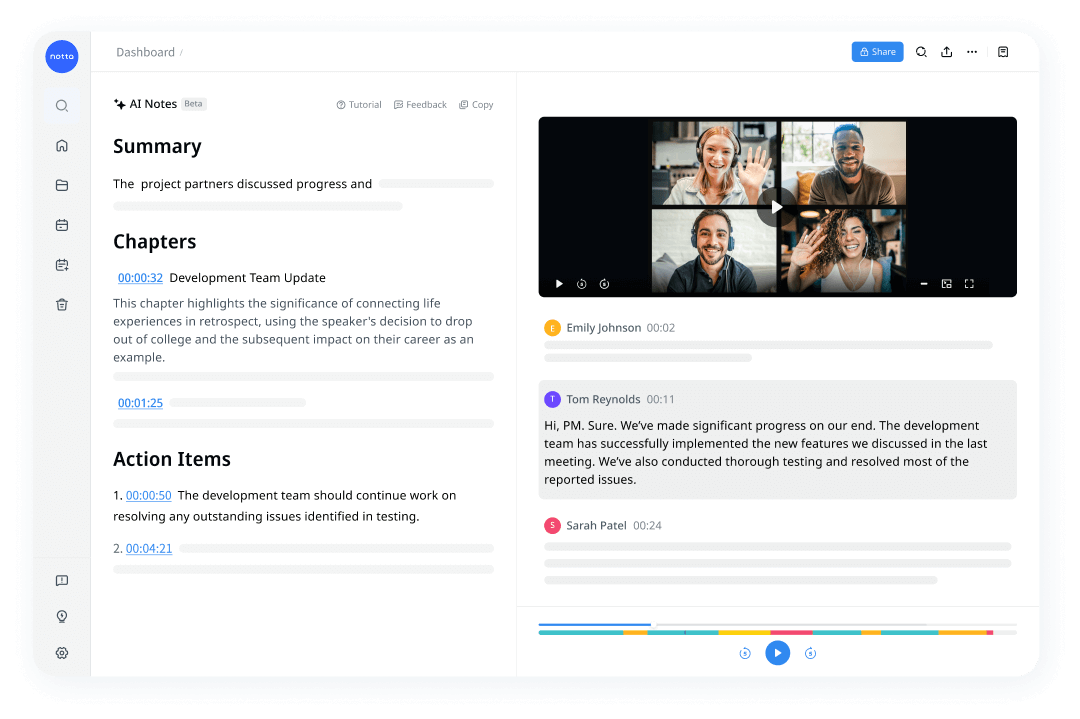Imagine you're invited to a morning meeting, and you've prepared and gathered all the important documents for the presentation. But the host cancels the meeting — and you've received a one-liner email stating, ‘The meeting has been canceled.’ (I can imagine your frustration)! Thankfully, you don't have to do this!
If you're hosting a meeting but the plans have changed somehow, it's important to notify everyone and make sure they're fine with the new changes. One of the best ways to do so is by writing a polite meeting cancellation email that helps everyone understand why the meeting is canceled in the first place.
I've written my fair share of business emails in my professional life. Here's how to write a meeting cancellation email, along with some examples.
What is a cancel meeting email?
A cancel meeting email is exactly what it sounds like — an email that's sent to inform the attendees about the meeting cancellation. It's typically sent by the host to cancel or reschedule the meeting. Here's what the meeting cancellation email should include:
Subject line: The meeting cancellation email should start with a clear subject line that states the purpose of the email.
Greeting: A professional greeting is a must when writing emails. It's like a virtual handshake with the attendees to build strong relations.
Apology: Remember, canceling a meeting means all the attendees have to change their schedule. For this reason, it's important to apologize for the inconvenience.
Reason: Next, include one or two paragraphs explaining the reason behind the meeting cancellation. I'd suggest keeping it short and straightforward to avoid wasting the reader's time.
Rescheduling details: If you're planning to reschedule the meeting for a later date, make sure to add the information to the cancellation email.
Closing statement: At the end of the email, write a professional thank you statement and give your contact information for any questions.
Why should you write a meeting cancellation email?
Nearly 71% of professionals lose time every week due to canceled or unnecessary meetings. While it's not possible to avoid canceling any meeting, you can (at least) write a polite email to cancel the meeting. Here are a few reasons why you must write a cancellation email:
Clear communication: If a meeting is canceled, the attendees might be worried about when the next meeting will take place. With a well-crafted email, you can answer the questions everyone might have.
Professional impression: Life happens, and meetings get canceled. Sending an email stating the reason and apology will leave a professional and positive impression.
Reduce inconvenience: Informing attendees about the changes in schedule will help them adjust their schedules and avoid unnecessary planning.
Never miss a meeting again
Create shareable events that connect with your calendar automatically using Notta's meeting scheduler.
How to write a professional email to cancel a meeting?
Writing emails is a tedious task — we all know that! I never spend more than 5 minutes when writing a work email — and I follow the same rule when writing a meeting cancellation email. But how to write a meeting cancellation email that actually sounds polite and conveys important information? Here's what I follow (and you can, too):
1. Add a clear subject line
The subject line of your email should directly indicate which meeting you're canceling and what time it was scheduled for. In short, you need to be as detailed as possible so the attendees bother to open the email and read what's written. Here's an example:
‘Writing department meeting scheduled on May 26 at 3:00 PM has been canceled.’
2. Use a professional opening statement
You're a human writing for humans, so make sure you're polite and professional throughout the email. You can personalize the opening statement by adding the recipient's name (Make sure you spell their names correctly!).
3. Explain the cancellation
This one's simple! You'll need to simply mention the genuine reason behind the meeting cancellation. For example, you can write something like, ‘
Hello, John! I'm writing to inform you that there's been some scheduling conflict, and I will have to cancel the meeting scheduled for May 26.’
4. Apologize for inconvenience
Remember, the attendees might have their schedules, appointments, and meetings to follow. A canceled meeting means they’ll have to change their schedule for the day. Hence, it's important to offer an apology for the inconvenience.
5. Offer to reschedule
If you've canceled an important meeting that needs to be rescheduled for later, you can also propose a new date and time in the email. I'd suggest adding a few different timings so the attendees can choose the one that aligns with their schedule.
6. End the letter with appreciation
At the end of the meeting cancellation email, thank everyone for understanding and write a professional closing statement. Depending on your professional relationship with the attendees, you can use closing statements like ‘Thank You, Sincerely, or Kind Regards.’
Meeting cancellation email example
If you don't want to start writing emails from scratch, here's a meeting cancellation email example you can customize:
Subject: Request to cancel marketing team meeting scheduled at 3:00 PM on May 26.
Hi, [Name of the Recipient]!
I'm writing to inform you that due to a scheduling conflict [or, you can insert some other reason], I'll have to cancel the [name of the meeting] scheduled for [insert time and date here].
I really apologize for all the inconvenience this meeting cancellation might have caused you.
It would be great if we could reschedule this meeting for a later date. I've checked our team calendar, and here are some of the dates that would work for the team. [Don't forget to add the time and date for the rescheduled event.]
Thank you for understanding and please feel free to drop me an email if you've any questions. I look forward to catching up with all of you shortly.
Best Regards,
[Your Name]
Tips for writing a polite meeting cancellation email
There's no doubt that finding the right words and format for a meeting cancellation email can be hard. But what's harder is to make sure the professional image remains intact. Here, I'll reveal some more tips you must keep in mind when writing a cancel meeting email:
Communicate as early as possible: You'll need to make sure all the attendees are notified about the canceled meeting as soon as possible. While it might vary depending on the situation and reason behind the cancellation, I'd recommend informing at least two hours before the scheduled time.
Be clear and polite: I can't stress this enough: You've to be very clear and polite when writing meeting cancellation emails. Remember, a canceled meeting can cause inconvenience to all the attendees, so make sure you are apologizing in the email and then offering a way to solve the problem.
Keep it short: Let's face it — nobody has time to go through all the emails they receive every day. So, it's better to respect the reader's time and include only the important details in the email.
Key takeaways
You may think you don't need meetings, but we all know they're an important part of our work life. If you find yourself writing a meeting cancellation email anytime, it's better to choose a template and customize it based on your needs.
Notta AI meeting assistant is a great alternative to canceling meetings due to scheduling conflicts or unavailability during meeting hours. Its Notta bot can automatically join your Zoom, Webex, Microsoft Teams, or Google Meet meetings to record conversations and generate transcripts.

FAQs
When should you cancel the meeting?
There can be many reasons for canceling a meeting, such as scheduling conflicts, work emergencies, lack of preparation, travel issues, lack of meeting agendas, personal stuff, or family emergencies. If you think you won't be able to attend the meeting, it's better to inform everyone sooner.
What are the alternatives to canceling a meeting?
If you don't want to cancel a meeting, there are many other alternatives you can consider. Here, I'll include my top picks:
Reduce meeting time: You don't have to host hour-long meetings. If you're planning to discuss a small project or a single idea, you may consider hosting quick huddles.
Only invite necessary attendees: It's always a best practice to avoid inviting all the team members. You must aim for meetings with eight or fewer people.
Host asynchronous meetings: If you want to cancel a meeting because not all the attendees are present at the same time, consider conducting asynchronous meetings where everyone can share ideas on their own schedules.
Use AI: If you're an attendee and don't want to miss the meeting, try AI tools like Notta with features like Notta bot. It's like your AI assistant, who can attend the meeting on your behalf and record everything. You can then review the transcripts and even generate a summary of what was discussed in the meeting.
How to reschedule a canceled meeting?
It's pretty easy to reschedule a canceled meeting, but it's a bit different from canceling. While rescheduling, you'll need to be polite and provide some alternatives to the attendees. For example, you could say, ‘There's some urgent work that has come up, and I will not be able to make it to our scheduled meeting. Can we move it to next Monday?’ Or, you can write, ‘How does next Wednesday or Thursday look on your calendar?’

